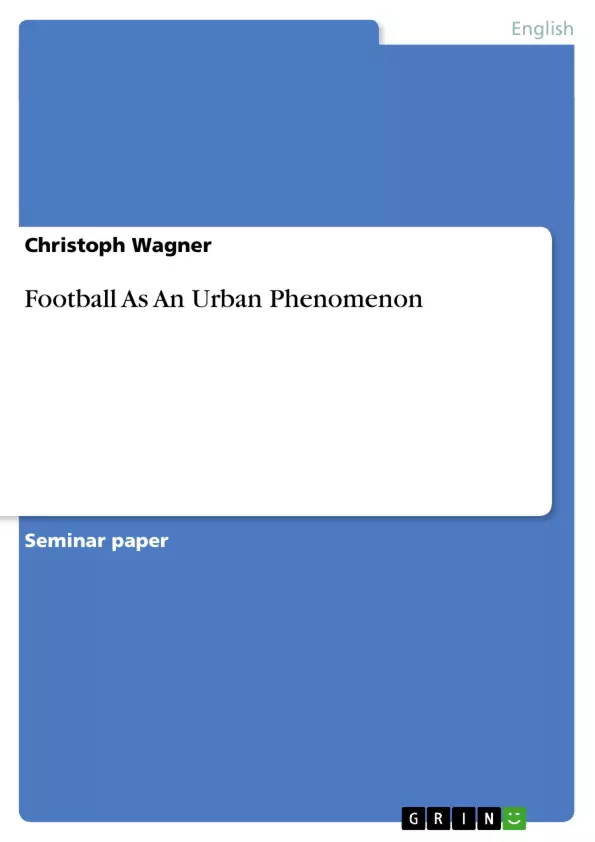When writing and talking about football the first thought is about which side is going to be German champion, European or World champion, which side will win the Champions League or the UEFA-Cup. Often the words go further onto the players, their wages that players earn too much money and much more that is directly linked with the game itself. Seldomly the talk is about such things as media influence and control, the development of the game, its sociological dimension or anything that plays an important role offside the pitch. Only when the clubs are nearly bankrupt or a new ground has to be built pub talk turns away from the game and its facts onto politics.
Inhaltsverzeichnis (Table of Contents)
- Introduction
- Regulation as a form of control
- A Case of Identity – The Working class taking the game as a shield for their pride and identity
- Affirmation of a Sense of Place – The stadium as a place which people consider to be holy.
- Conclusion
Zielsetzung und Themenschwerpunkte (Objectives and Key Themes)
This paper explores the role of football as an urban phenomenon, examining how it became an expression for the working class while also serving as a tool of control for the upper classes. It analyzes the significance of the football ground as a site for ritualistic practices and how it contributed to a sense of place and locality for the working class.
- Football as a symbol of working-class identity and pride
- Regulation of football as a form of social control
- The football ground as a site of ritual and belonging
- The role of football in class relations and social mobility
- The impact of industrial decline and immigration on football
Zusammenfassung der Kapitel (Chapter Summaries)
- Introduction: This chapter introduces the topic of football and its significance beyond the game itself, exploring its sociological dimension and how it became an expression of working-class identity. It highlights the evolution of the game from its early days, including the influence of class dynamics.
- Regulation as a form of control: This chapter examines the role of the Football Association (FA) in regulating the game and how this regulation served as a tool of control for the upper classes. It discusses the early development of the game and how clubs were often controlled by the middle class, emphasizing the tension between the classes in early football.
Schlüsselwörter (Keywords)
This paper focuses on the concepts of class, control, identity, and place as they relate to football. It examines the interplay between working-class identity, upper-class control, and the evolution of the football ground as a symbol of community and belonging. It explores how the game was used as a means of social control and how it became an expression of working-class pride and resistance.
Frequently Asked Questions
Why is football considered an urban phenomenon?
The paper argues that football evolved alongside industrial urbanization, becoming a central expression of working-class identity and community in city environments.
How was football used as a tool of social control?
Upper and middle classes regulated the game through the Football Association (FA) to instill discipline and manage the leisure time of the working class.
What is the significance of the football ground?
The stadium is viewed as a "holy" place for fans, serving as a site for ritualistic practices that affirm a sense of place and local belonging.
How did class relations shape the early game?
Early football was a site of tension between the working class, who played it with pride, and the middle class, who often controlled the clubs and governing bodies.
What sociological dimensions of football are explored?
Beyond the scoreline, the paper looks at media influence, industrial decline, immigration, and how football acts as a shield for class identity.
- Quote paper
- Christoph Wagner (Author), 2004, Football As An Urban Phenomenon, Munich, GRIN Verlag, https://www.grin.com/document/24663



